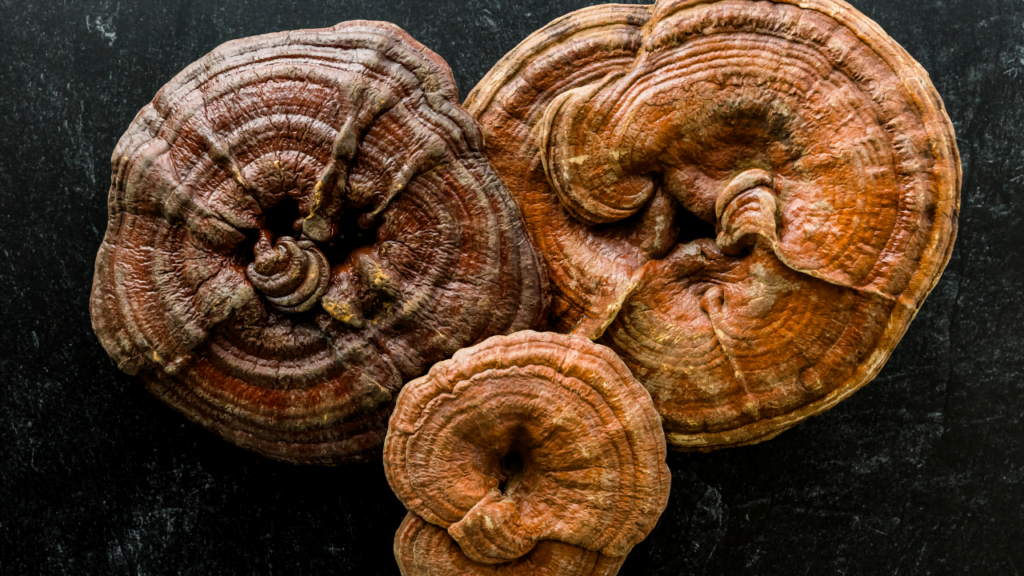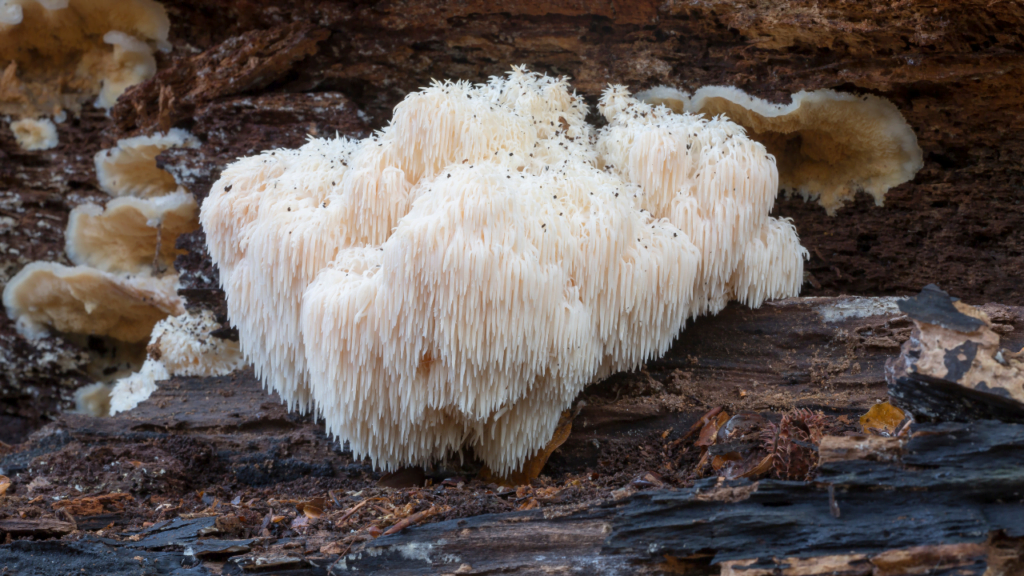Gummy candies have long been a beloved treat, enjoyed by people of all ages. But what if these chewy delights could offer more than just a burst of sweetness?
Enter mushroom gummies, an exciting new trend in the realm of dietary supplements!
By combining the delectable allure of gummy candies with the potential health benefits of medicinal mushrooms, these unique gummies have captured the attention of health-conscious individuals seeking a convenient and enjoyable way to support their well-being.
Mushroom gummies are delicious supplements that infuse bite-sized, flavorful treats with the goodness of medicinal mushrooms.
Among the popular mushroom species found in these gummies are Reishi, Lion’s Mane, Chaga, and Cordyceps.
Each of these mushrooms brings its own unique set of potential health benefits, which range from immune support and cognitive enhancement to stress reduction and increased energy levels.
We’ll emphasize the significance of reputable brands, quality control measures, and seeking guidance from healthcare professionals to ensure a safe and effective experience.
Making informed choices, tailored to our unique circumstances, will allow us to maximize the potential of mushroom gummies.
Some of the links in this post are affiliate links. This means if you click on the link and purchase the item, I will receive an affiliate commision at no extra cost to you. All opinions remain my own. Read more on our Privacy Policy page
What are Mushroom Gummies
The Composition of Mushroom Gummies
Mushroom gummies are a unique type of dietary supplement that brings together the delightful texture and flavor of gummy candies with the potential health benefits of medicinal mushrooms. These gummies offer a convenient and enjoyable way to incorporate the therapeutic properties of mushrooms into our daily lives.
Composed of thoughtfully selected ingredients, mushroom gummies typically contain a blend of medicinal mushrooms, natural sweeteners, flavors, and other components that enhance their texture and stability. While the specific composition may vary across brands, the primary focus remains on infusing the gummies with the bioactive compounds found in medicinal mushrooms.
Common Medicinal Mushrooms Found in Gummies (Reishi, Lion’s Mane, Chaga, Cordyceps)
Mushroom gummies feature a variety of medicinal mushrooms, each known for its distinct characteristics and potential health benefits. Among the most frequently used mushrooms in these gummies are:
- Reishi (Ganoderma lucidum): Reishi mushrooms, often called the “king of mushrooms,” have a rich history in traditional Chinese medicine. They are believed to support immune function, aid in relaxation, and exhibit adaptogenic properties.
- Lion’s Mane (Hericium erinaceus): Lion’s Mane mushrooms, with their cascading white spines resembling a lion’s mane, are highly regarded for their potential cognitive benefits. These include improved focus, memory, and mental clarity. Lion’s Mane is also associated with potential nerve-regenerating properties.
- Chaga (Inonotus obliquus): Chaga mushrooms primarily grow on birch trees and have been used in traditional Siberian and Russian medicine. They are known for their antioxidant properties and potential support for the immune system.
- Cordyceps (Cordyceps sinensis): Cordyceps mushrooms have a fascinating life cycle, involving parasitic growth on insect larvae. They are believed to offer various health benefits, including potential energy-boosting and endurance-enhancing effects. Cordyceps is also associated with supporting respiratory health.
These medicinal mushrooms have a long-standing history of use in different cultures and are now incorporated into mushroom gummies to harness their potential benefits in a convenient and enjoyable format.

Potential Health Benefits
Medicinal mushrooms have garnered attention for their potential to promote various health benefits. When incorporated into mushroom gummies, these advantages become accessible and enjoyable. Let’s delve into the potential positive impacts associated with medicinal mushrooms and their potential effects on our well-being.
Extensive scientific research has investigated the bioactive compounds found in mushrooms and their potential effects on the body. These studies provide substantial evidence supporting the claims associated with medicinal mushrooms. Through rigorous examination, scientists have shed light on the therapeutic properties of these fungi, lending credibility to their potential health benefits.
Reishi:
Reishi mushrooms are lauded for their immune-boosting properties. Rich in polysaccharides and triterpenes, they may enhance immune function, reduce inflammation, and support overall well-being. Additionally, Reishi is recognized as an adaptogen, assisting the body in adapting to stress.
Lion’s Mane:
Lion’s Mane mushrooms are primarily celebrated for their potential cognitive benefits. Compounds like erinacines and hericenones found in Lion’s Mane may stimulate nerve cell growth, fostering brain health. Improved memory, focus, and mental clarity are among the cognitive functions believed to be enhanced by Lion’s Mane.
Chaga:
Chaga mushrooms possess high levels of phenolic compounds, equipping them with potent antioxidant properties. These antioxidants may shield cells from oxidative stress and bolster immune health. Chaga mushrooms also exhibit potential anti-inflammatory effects and have been traditionally employed to support digestive well-being.
Cordyceps:
Cordyceps mushrooms are renowned for their potential to boost energy and enhance stamina. Cordycepin and adenosine are key compounds found in Cordyceps that may enhance oxygen utilization and improve physical performance. Additionally, Cordyceps mushrooms are associated with respiratory support and potential anti-inflammatory properties.
While these mushrooms are highlighted for their specific benefits, it’s crucial to recognize that each mushroom species possesses a unique blend of bioactive compounds contributing to its potential advantages.
Nutritional Profile and Ingredients
Mushroom gummies not only provide a delightful taste experience but also offer a range of nutrients that contribute to their overall nutritional profile. While the exact composition may vary among brands, these gummies typically contain a combination of macronutrients and micronutrients. Common components include carbohydrates, proteins, fats, vitamins, and minerals. However, it’s essential to consider that specific amounts may vary depending on the formulation and serving size of the gummies.
Active Compounds in Medicinal Mushrooms
The potency of medicinal mushrooms lies in their bioactive compounds, which contribute to their potential health benefits. Each mushroom species possesses a unique set of active compounds that play a crucial role in their therapeutic properties. Here are some examples:
- Reishi mushrooms contain polysaccharides, triterpenes (such as ganoderic acids), and sterols, which are associated with immune-boosting and anti-inflammatory effects.
- Lion’s Mane mushrooms are rich in erinacines and hericenones, compounds believed to enhance cognitive function and provide neuroprotective benefits.
- Chaga mushrooms contain phenolic compounds like betulinic acid and melanin, known for their antioxidant and immune-supporting properties.
- Cordyceps mushrooms contain cordycepin, adenosine, and other bioactive compounds associated with energy enhancement, improved endurance, and respiratory support.
These active compounds are of particular importance when incorporating medicinal mushrooms into mushroom gummies, as they contribute to the potential health benefits offered by these gummies.
Other Ingredients in Mushroom Gummies and Their Purpose
Apart from medicinal mushrooms, mushroom gummies may include other ingredients that serve various purposes.
These can include natural sweeteners such as fruit juices or organic cane sugar, natural flavors to enhance taste, and plant-based gelling agents like pectin for texture. Additional components might include citric acid for a touch of tartness or vitamin C as an added nutrient.
When considering mushroom gummies, it is crucial to review the product labels and ingredient lists to identify any potential allergens or additives that may not align with your dietary preferences or restrictions.
By gaining insight into the nutritional content of mushroom gummies, the key active compounds found in medicinal mushrooms, and the role of other ingredients, you can make informed decisions about integrating these gummies into your wellness routine.
Reveal the Sweet Secret to Youthful Aging: Introducing Keto Gummies
Historical and Cultural Significance of Medicinal Mushrooms
Medicinal mushrooms have been revered for their healing properties across diverse cultures throughout history. Traditional medicinal practices, including those in Chinese, Japanese, and indigenous communities, have long recognized the unique qualities of mushrooms and incorporated them into their healing traditions.
In traditional Chinese medicine, mushrooms like Reishi and Cordyceps have held significant value for promoting overall well-being, restoring balance, and supporting vitality. Similarly, indigenous cultures have utilized mushrooms such as Chaga and Lion’s Mane for their medicinal properties, often valuing their ability to address specific ailments and enhance overall health.
With advancements in scientific research, the bioactive compounds and potential health benefits of these mushrooms have garnered increased attention. This has paved the way for innovative mushroom-based products like gummies, which combine traditional wisdom with modern convenience to provide a contemporary avenue for accessing the potential therapeutic properties of these remarkable fungi.
Understanding the composition and historical significance of mushroom gummies lays the foundation for exploring their potential health benefits and the considerations involved in incorporating them into our wellness routines.

Signs You Are Aging Well: Embracing a Healthy and Vibrant Life
Usage and Dosage Recommendations

To make the most of mushroom gummies, it’s crucial to follow the dosage guidelines provided by the manufacturer. These recommendations may vary depending on factors such as the specific mushroom species used, concentration of active compounds, and intended purpose of the gummies.
As a general practice, it’s advisable to start with the lowest recommended dosage and gradually increase as needed while observing your body’s response. Remember, mushroom gummies are meant to complement a balanced diet and should not be used as a substitute for proper nutrition.
Considerations for Different Age Groups and Health Conditions
Taking age groups and individual health conditions into account is essential when incorporating mushroom gummies. Here are some key considerations:
Children and Adolescents:
If considering mushroom gummies for children or adolescents, it is important to consult with a healthcare professional or pediatrician. They can provide guidance on appropriate dosages based on age, weight, and individual needs.
Pregnancy and Breastfeeding:
Expectant or nursing mothers should seek advice from a healthcare professional before consuming mushroom gummies. They can offer personalized recommendations considering the specific circumstances and potential effects on maternal and fetal health.
Health Conditions:
Individuals with underlying health conditions, such as autoimmune disorders, diabetes, or liver problems, should consult with a healthcare professional before incorporating mushroom gummies. They can provide guidance based on the specific condition, potential interactions, and suitability of mushroom gummies for their overall well-being.
Potential Interactions with Medications or Allergies
If you are taking medications, it is crucial to discuss the use of mushroom gummies with your healthcare provider. Certain medicinal mushrooms may interact with medications such as blood thinners or immunosuppressants, necessitating adjustments to dosage or careful monitoring.
Additionally, individuals with known allergies to mushrooms or any other ingredients commonly found in gummies should carefully review the product labels. Consulting with a healthcare professional is advisable to ensure the gummies are safe for consumption and won’t trigger an allergic reaction.
By considering potential interactions with medications and being aware of any allergies or sensitivities, you can safely incorporate mushroom gummies into your wellness routine and make informed decisions regarding their usage.
Always remember to consult with a healthcare professional or registered dietitian before making significant changes to your diet or starting any new dietary supplement. They can provide personalized advice based on your specific health needs, medication regimen, and potential allergies or contraindications.
Potential Drawbacks and Risks

Possible Side Effects or Adverse Reactions of Mushroom Gummies
While generally considered safe, it’s important to be aware of potential side effects or adverse reactions that may occur with mushroom gummies. These effects can vary based on individual sensitivity, dosage, and specific mushroom species used. Potential side effects may include:
- Digestive discomfort, such as bloating, gas, or upset stomach.
- Allergic reactions in individuals with known mushroom or ingredient allergies.
- Interactions with medications or medical conditions, such as blood thinners or autoimmune disorders.
If you experience any adverse reactions or unusual symptoms after consuming mushroom gummies, discontinue use and consult with a healthcare professional.
Precautions for Specific Groups
Certain groups should take precautions or seek professional advice before using mushroom gummies:
- Pregnant or breastfeeding women: Consult with a healthcare professional to ensure the safety and suitability of mushroom gummies during pregnancy or lactation.
- Individuals with autoimmune diseases: Mushroom gummies may have immune-modulating effects, so consultation with a healthcare professional is recommended to assess safety and potential interactions.
- Children and adolescents: Follow specific dosage guidelines and consult with a healthcare professional before giving mushroom gummies to young individuals.
Importance of Quality Control and Reputable Brands
Selecting high-quality mushroom gummies from reputable brands is crucial. Prioritize products that undergo rigorous quality control measures and are sourced from reliable suppliers. Reputable brands provide transparent information about sourcing, testing, and production processes.
By choosing reputable brands, you can minimize the risks associated with contaminants, inaccurate dosing, or mislabeling. Prioritizing quality ensures you’re getting safe and accurately labeled mushroom gummies.
Remaining aware of potential side effects, taking necessary precautions for specific groups, and opting for reputable brands will help you make informed decisions and mitigate potential risks when incorporating mushroom gummies into your wellness routine.
Revitalizing Radiance: Unlocking the Anti-Aging Secrets of Essential Oils
Alternatives and Complementary Approaches
Exploring Other Forms of Consuming Medicinal Mushrooms
In addition to mushroom gummies, there are various alternative ways to incorporate medicinal mushrooms into your routine. These include capsules, powders, and teas. Each form offers unique benefits and considerations, catering to individual preferences.
Capsules: Medicinal mushroom extracts are often available in capsule form, providing a convenient and straightforward way to consume them. Capsules offer precise dosing and are ideal for those seeking simplicity and ease of use.
Powders: Medicinal mushroom powders can be added to a wide range of foods and beverages, allowing for versatility and customization. They offer flexibility in incorporating mushrooms into smoothies, teas, coffee, or even cooking and baking recipes.
Teas: Mushroom teas involve steeping dried mushroom slices or powder in hot water, creating a soothing and therapeutic beverage. This traditional method allows you to savor the flavors and aromas of medicinal mushrooms while enjoying their potential benefits.
Premium Chaga Mushroom Powder – 8 oz of Authentic 100% Wild Harvested Canadian Chaga Tea – Superfood
Benefits and Drawbacks of Different Consumption Methods
- Benefits:
- Gummies: Convenient and enjoyable taste, pre-dosed for easy consumption.
- Capsules: Precise dosing, convenient for on-the-go use.
- Powders: Versatile, can be incorporated into various recipes and beverages.
- Teas: Traditional and soothing, providing a mindful way to enjoy medicinal mushrooms.
- Drawbacks:
- Gummies: May contain added sugars or ingredients that may not align with certain dietary preferences.
- Capsules: Some individuals may find swallowing capsules challenging.
- Powders: Strong flavor may not be desirable for everyone.
- Teas: Preparing mushroom tea requires additional time and effort.
Considering the benefits and drawbacks of each consumption method will help you determine the most suitable approach for integrating medicinal mushrooms into your routine.
Combining Mushroom Gummies with a Varied Diet Rich in Prebiotic Foods
To maximize the potential health benefits of mushroom gummies, it is important to maintain a well-rounded diet that includes a variety of nutrient-rich foods. Including prebiotic-rich foods, such as onions, garlic, leeks, bananas, and whole grains, can complement the effects of mushroom gummies on gut health.
Prebiotics nourish beneficial gut bacteria, supporting a healthy gut microbiome. When combined with mushroom gummies, a diverse, prebiotic-rich diet can work synergistically to enhance overall well-being and promote optimal gut health.
Remember to consult with healthcare professionals or registered dietitians for personalized advice on incorporating medicinal mushrooms into your diet and determining the most suitable approach based on your specific needs and health conditions.
Unveiling the Power of Bone Broth: Top Benefits for Anti-Aging
Conclusion
It is crucial to underscore the importance of seeking individualized advice and consulting with healthcare professionals or registered dietitians before incorporating mushroom gummies into your wellness routine. They can provide personalized guidance based on your specific health needs, medications, and potential allergies. This ensures that you make informed decisions and consider any potential interactions or contraindications.
In conclusion, mushroom gummies offer a convenient and enjoyable way to potentially reap the benefits of medicinal mushrooms in your daily life. While they should not replace a balanced diet, they can complement a diverse and nutrient-rich eating plan. It’s important to recognize that the world of mushrooms is vast, and ongoing research may continue to uncover new insights into their therapeutic properties.
By understanding the composition, benefits, drawbacks, and precautions associated with mushroom gummies, you can make informed choices to support your overall well-being. Remember, the decision to incorporate mushroom gummies into your routine should be made in consultation with healthcare professionals who can provide personalized advice and ensure their safe and appropriate use.
Embrace the potential of mushroom gummies as part of your holistic wellness journey, knowing that ongoing exploration of medicinal mushrooms may continue to unveil their remarkable benefits.
FAQs
Q1: What are the benefits of mushroom gummies?
Mushroom gummies offer potential benefits due to the medicinal properties of the mushrooms they contain. Different mushroom species, like Reishi, Lion’s Mane, Chaga, and Cordyceps, may provide various advantages. These can include supporting the immune system, enhancing cognitive function, offering antioxidant effects, and potentially providing an energy boost. It’s important to note that individual experiences may vary, and consulting with healthcare professionals for personalized advice is advisable.
Q2: Do mushroom supplements really work?
Scientific research supports the potential health benefits of medicinal mushrooms found in supplements. These studies highlight the bioactive compounds present in mushrooms that may contribute to therapeutic effects. However, the efficacy of mushroom supplements can vary based on factors such as dosage, quality, individual response, and specific health conditions. Seeking personalized advice from healthcare professionals is recommended to ensure appropriate use of mushroom supplements.
Q3: Do mushroom gummies give you energy?
Certain mushroom species, such as Cordyceps, are believed to have potential energy-boosting properties. These mushrooms contain compounds that may enhance oxygen utilization and physical performance. However, individual responses may vary, and it’s important to note that mushroom gummies should not be relied upon as the sole source of energy. A balanced diet, regular exercise, and sufficient rest are also essential factors for maintaining energy levels.
Q4: How long does it take for mushroom supplements to work?
The time it takes for mushroom supplements to take effect can vary depending on factors like the specific mushroom species, dosage, individual metabolism, and the purpose of supplementation. Immediate effects, such as an energy boost or cognitive enhancement, may be noticeable relatively quickly. However, other benefits, like immune support or long-term cognitive improvements, may require consistent and prolonged use to experience significant effects. It’s important to follow recommended dosage guidelines and allow sufficient time for the body to respond to the supplement.





